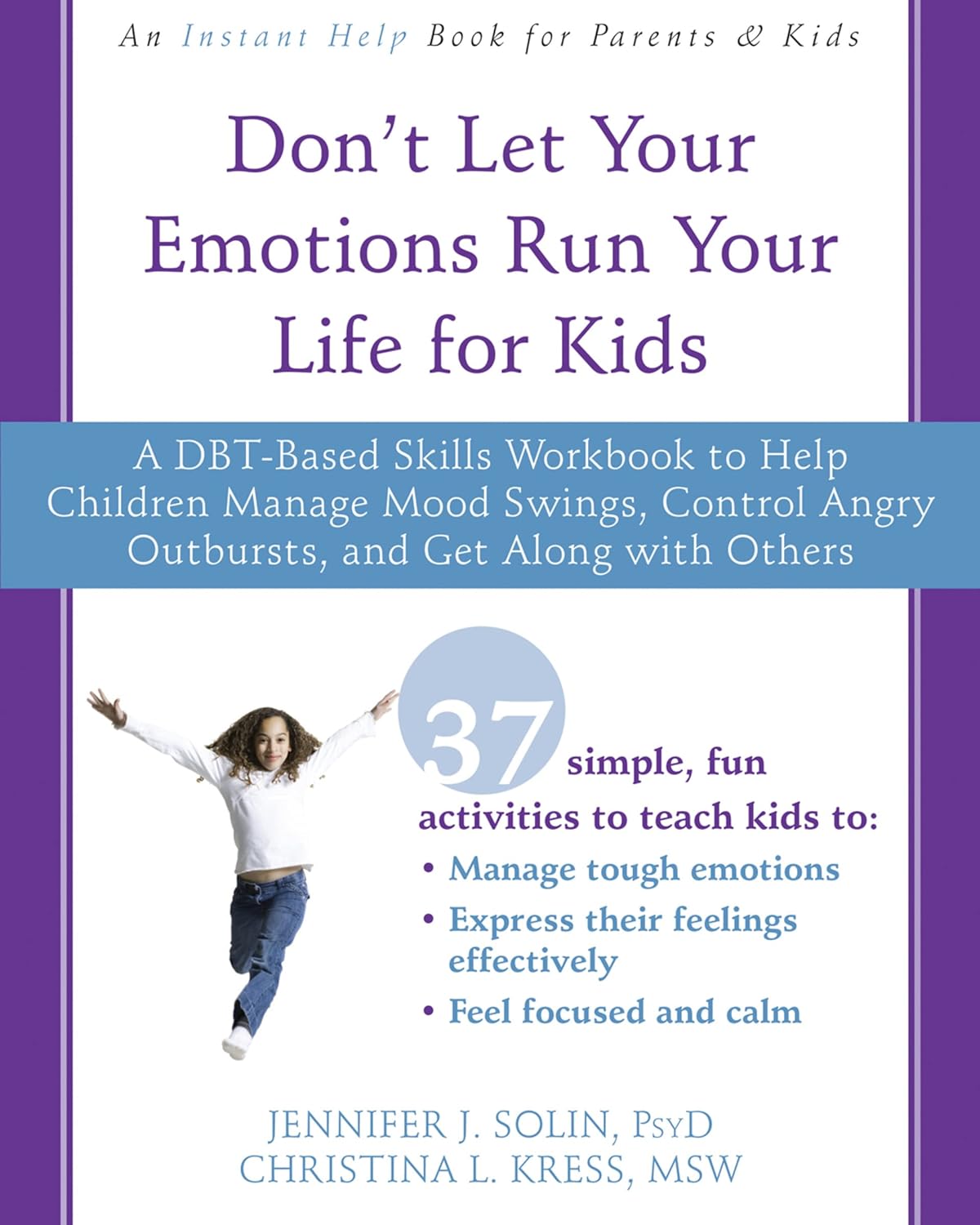
Don’t Let Your Emotions Run Your Life for Kids: A DBT-Based Skills Workbook to Help Children Manage Mood Swings, Control Angry Outbursts, and Get Along with Others
In this much-needed guide, two dialectical behavior therapists offer an activity-based workbook for kids who struggle with anger, mood-swings, and emotional and behavioral dysregulation. Using the skills outlined in this book, kids will be able to manage their emotions, get along with others, and do better in school.
Childhood can often be a time of intense emotions. But if your child’s emotions interfere with school, homework, or tests; alienate them from their peers; make it difficult to forge lasting friendships; or cause constant conflicts at home—it’s time to make a change. You need help to calm the chaos now, rather than later.
Building on the success of Don’t Let Your Emotions Run Your Life and Don’t Let Your Emotions Run Your Life for Teens, this is the first dialectical behavior therapy (DBT) activity skills workbook designed especially for kids. Designed for children ages 7 to 12, this essential guide will help kids manage difficult emotions and get along better with others.
If you are frustrated or worried about your emotional child, the hands-on activities in this book—including child-friendly mindfulness practices—can help. By reading this book, kids will develop their own “skills tool box” for dealing with intense emotions as they arise, no matter where or when.
My Account Info
Manage your Membership information, email preferences, and more.
Journals
Membership in ABCT grants you access to three journals.
Convention
We are now accepting Abstract submissions for Continuing Education Ticketed Sessions at the 2024 ABCT Convention in Philadelphia, PA.
My Account Info
Manage your Membership information, email preferences, and more.
Journals
Membership in ABCT grants you access to three journals.
Convention
We are now accepting Abstract submissions for Continuing Education Ticketed Sessions at the 2024 ABCT Convention in Philadelphia, PA.
Editorial Reviews
“Don’t Let Your Emotions Run Your Life for Kids is a simple yet comprehensive tool facilitating meaningful dialogue between parents, caregivers, family members, and children for explaining and exploring emotions. The workbook discusses a variety of emotions using language geared towards children, and provides concrete examples of what emotions ‘look’ like while giving children the tools needed to identify and communicate their emotional experiences. The exercises are designed to teach the child using easily understandable concepts and ‘kid friendly,’ concrete exercises to help guide them through each concept. The activities are designed to facilitate an enriched learning experience, uniquely applicable to each child. The workbook is well written, and the authors are clearly compassionate and dedicated to helping children recognize their emotions and how those emotions impact the world around them.”
—Julie A. Vandermay, PsyD, MA, forensic neuropsychology resident at Natalis Counseling & Psychology Solutions
“Don’t Let Your Emotions Run Your Life for Kids effectively conveys useful information about the challenging emotions children face, and ways for kids to deal with them in language far more accessible than most material available on these topics. As a plus, parents who assist their children in the useful exercises provided in the book may well find themselves picking up helpful tips for managing their own emotions as well!”
—Mark Carlson-Ghost, PhD, associate professor at the Minnesota School of Professional Psychology at Argosy University-Twin Cities Campus
“Don’t Let Your Emotions Run Your Life for Kids is a great resource for children in that it provides clear explanations to help them gain understanding about what emotions are and why we have them, and it and contains both fun and educational activities to assist them in learning how to express emotions more effectively. Parents will also benefit from this workbook because it provides them with clear, straightforward, age-appropriate language they can use to talk to their children about feelings in a manner that will facilitate an open dialogue and enhance the parent-child relationship.”
—Ilyssa Siegel, PsyD, mental health practitioner at an addiction treatment center
“Very well done! I do dialectical behavior therapy (DBT) with adults, and I could easily see the transition to kid-friendly language and concepts without losing any information. I think kids will be able to dive into these concepts quickly and easily. I can see this as being very helpful in a variety of settings.”
—Reena Pathak, PsyD, licensed psychologist
“Don’t Let Your Emotions Run Your Life for Kids provides an easy-to-understand and effective set of tools to help kids navigate the complexities of emotions they may be struggling with. The tools help kids learn to understand, manage, and express their thoughts and feelings in ways that will help enhance their lives and reduce turmoil they might otherwise experience. These simple yet powerful tools draw from modern-day clinical methods which are helpful in reducing distress and increasing one’s ability to interact with others in meaningful ways.” —Robert Hoppe, PsyD, licensed psychologist
“This workbook provides an excellent tool for professionals and parents alike to skillfully empower children to learn to manage difficult emotions through practical and engaging examples and activities.”
—Megan Thumann, PsyD, licensed psychologist and mother of four boys
About the Author(s)
Christina Kress
Christina L. Kress, MSW, is a licensed clinical social worker in private practice in St. Paul, MN. Kress has over twelve years of experience treating young children with play therapy and CBT, along with over four years’ experience treating adults...
Read MoreJennifer Solin
Jennifer J. Solin, PsyD, is a licensed psychologist in private practice in St. Paul, MN. She has over ten years of experience working primarily with children and families, and six years of experience working primarily with adolescents and adults. Psychological...
Read MoreBack
